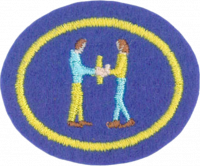Especialidades JA/Dirección de menores/Respuestas
Nivel de destreza
3
Año
1945
Version
23.12.2024
Autoridad de aprobación
Asociación General
1
2
3
3a
3b
3c
3d
4
5
6
For this discussion we will refer to 10 to twelve year-old Pathfinders as "juniors" and 13-16 year-old Pathfinders as "teens." More information on this topic can be found in the Pathfinder Staff Manual (see chapter 2).
6a
Juniors are generally a very healthy group of kids, and they are very active. They need to move, so a good Pathfinder program will have "moving" times built in to it (Marching and Drilling, games, etc.) to harness that energy productively.
Teens are very concerned about their appearance. They will often engage in innocuous physical contact with a certain girl or boy of whom they harbor romantic thoughts. This may include "slugging" them on the shoulder or lightly pushing them.
The teenage years are a time of rapid growth. The mind may still say that their shoe size is 7 when 11 is more like it. This can cause clumsiness and lead to embarrassment.
6b
Juniors remember almost everything you say. If you say "next week we are going to go on a nature hike," you had better go on a nature hike next week. If you do not, they will remind you of what you said. Be very careful of the things you promise to them, and never make a threat you are not willing to execute. If you get in a situation where consequences are called for, it is better to say "there will be consequences for that" and decide what those consequences are later rather than making a spur-of-the-moment threat that you will regret later.
Furthermore, juniors will remember what the consequences for a given infraction were for Johnny, the consequences for the same infraction had better be about the same for Billy. They recognize and remember unfairness.
Teens will continue to love and follow the adults in their lives that they loved and followed as juniors. If you become their "hero" when they are 12, they will still respect you when they are 16.
The teen years are an emotional roller coaster. Their bodies are coursing with hormones that make them very moody. One can easily be on the top of the moon at the beginning of an activity and an emotional mess before it's over. Girls tend to cry and get it all out (especially with trusted girlfriends), while boys tend to internalize negative emotions that can erupt at the slightest provocation.
Teens will sometimes challenge your authority. This will sometimes come in the form of the Pathfinder uniform. If a teen shows up for Induction with pink shoes instead of the regulation black, call them on it. If you do not, they may very well show up in baggy pants at the next Class A uniform event. You do not need to make a big scene - just let them know that you did notice and that their choice is not in line with your expectations.
6c
Junior Pathfinders love to collect things - it could be anything from the traditional stamps and coins to the more bizarre. Many AY honors involve making collections (Insects, Shells, Rocks and Minerals, etc.) so use this to your advantage.
Juniors are eager to learn and can memorize things quickly. They like to read.
Juniors are into "secret codes" and handshakes. They like adventure, and they love stories. Be careful when telling them the exploits of your own youth. If you ever tell them about the wrong things you did as a child, make sure you tell them what the consequences were as well. Also remember that they may try to reproduce your youthful adventures.
It is important that when you teach hands-on activities to this age group that it is their hands that are on, and not yours. If you jump in and do their activities for them, they will quickly lose interest. Instruct them how to do something, but then put your hands behind your back. Let them do it!
Logic plays a large role in a teen's thinking, as it is at this age that they become critical thinkers. They will compare what you say to what you do and note any inconsistencies.
If teens were cars, they would have excellent acceleration and lousy brakes. They may think of an idea and dive in before thinking of the consequences. If they do consider the consequences before it is too late, they may still have difficulty putting on the brakes. If they know that a well-loved adult leader (hopefully this is you) will be disappointed in their actions, that is sometimes enough to kick in the brakes. If they respect you, they do want your approval.
6c
Juniors are very interested in what goes on in church. They are eager to help take up the offering in church. Most baptisms in the Adventist church take place among this age group.
Do not discuss negatives in front of this age group. If there are problems in your club that require discussion with other staff, save them for staff meetings. Juniors will pick up on bad vibes, and if you complain about another staff member in front of them, you will undermine that staff's authority with them.
Juniors will take your word as authoritative on spiritual matters. Teens will challenge you, citing objections or inconsistencies.
Teens will wrestle with their consciences, but remember - their braking system is not yet fully developed. They do succumb to peer pressure, but they also repent. Be ready to forgive them, and remember that if they already realize they have made a mistake, a lecture may be unnecessary. Sometimes they just need a friend.
7
7a
7b
7c
7d


